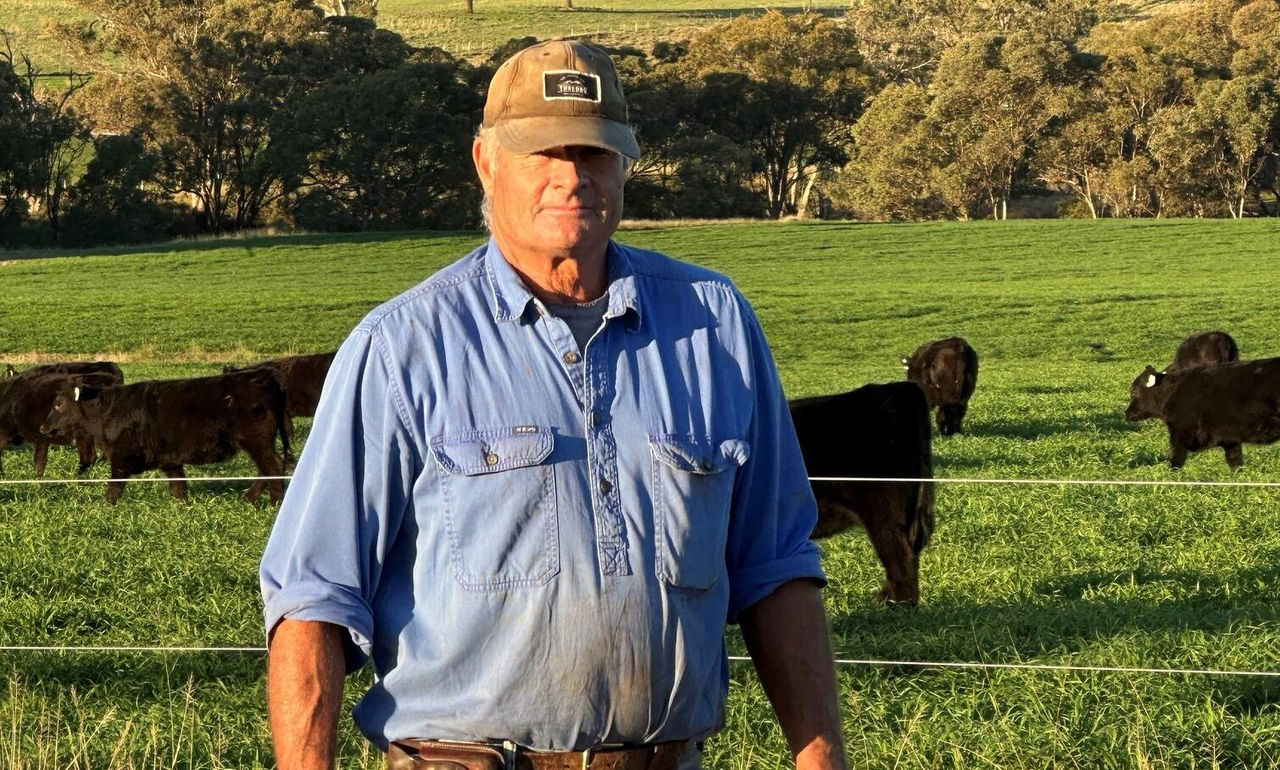Posted by on
23/05/2024
When it comes to reducing emissions on his Angus cattle operation, Coolah’s Ralph Kuhn believes mitigating methane through modifying the ruminant has valuable potential.
A former vet, Ralph’s expertise in ruminant physiology has proven beneficial since he began exploring opportunities to reduce his farm’s environmental footprint, and admits his knowledge on rumen function makes the conversation much clearer.
“I specialised in broadacre beef cattle production, which has been helpful,” he explains. “The climate is changing, and while I don’t think agriculture has a case to answer, it is apparent we will be expected to eliminate, offset, or at least moderate, emissions.”
Water injection technology is one such avenue Ralph is exploring, and he will potentially soon take part in a trial running a methane-reducing supplement through reticulated water points across his 5,300 hectare property.
It’s part of Australia’s first methane abatement project, whereby water-soluble livestock supplements containing the essential oils-based additive Agolin can now be delivered through water dosing technology.
“Nutrients supplied from a reservoir is injected into the animals’ water supply, with a flow meter used to measure the average daily intake of the animals, and technology enabling the correct administration of the desired dose,” he explains.
The trial water medication incorporates Agolin, which is a class of feed additive where the active ingredient can modify the rumen to produce less methane.
“The inherent capability of Agolin to boost production is relatively low,” he believes. “Some argue, as a result of less methane being produced that this is in fact increasing the energy available to the animal, which is still to be validated.”
“Probably the greatest advantage from our perspective is that Agolin is generally compatible with other supplements and micronutrients we are delivering, and may inherently boost productivity to some extent.”
“It’s early days, and everyone is waiting for the potential methane-eliminating silver bullet, but there are dozens of methane-prohibiting products in development, and I’m sure with that many minds on it, we’re sure to make some exciting inroads.”
“Even if we can reduce our methane by 30 or 40 percent, that’s a big stride.”
Breeding a sustainable herd
Ralph is also looking to genetics for a more sustainable future herd – today’s breeding technology and data availability present a valuable opportunity.
“Methane emissions are very highly correlated to Feed Conversion Efficiency (F.C.E.), and because we have been performance recording a portion of our herd for upwards of 30 years our gene pool is well-described and highly genetically linked to our seedstock provider’s herd.”
“This, combined with advances in DNA technology puts us on the cusp of being able to accurately estimate the methane emissions of each individual animal in our herd.”
“Currently, our seedstock producer is testing and collecting data on individual animal F.C.E. on a relatively large scale which will open the way for us to identify those animals that produce less methane, and select accordingly.”
Genetic selection in conjunction with dietary additives offers genuine avenues, Ralph believes, for methane reduction.
“We simply can’t plant enough trees to maintain productivity and become carbon neutral, so technology and breeding are exciting, and realistic, prospects for producers.”
Ensuring maximum productivity to decrease methane intensity would also help reduce the level of methane being produced per unit, however, he concedes that increasing efficiency will probably lead to increased total production, so this is likely to increase his overall footprint, and as such is not useful for carbon neutrality.
Rabobank Carbon Training Workshop provides valuable knowledge
Having participated in a Rabo Carbon Training Workshop, developed by Dr Richard Eckard from The University of Melbourne, Ralph said he was encouraged by the fact the conversation aligned with his own perceptions.
“I wasn’t sure what to expect, yet it was a really worthwhile course, and the solutions discussed were along the theme of modifying the rumen.”
“The science around potentially ‘programming’ the rumen through careful management and injections at weaning is also particularly hopeful.”
When discussing methane with neighbours and friends, Ralph says most realise there’s an imperative to shift their management, but are inhibited knowing what the first step is.
“This workshop provided a really useful starting point, and it was great to be in the room learning together, with lots of time dedicated to explaining the politics and global fundamentals behind the expectation of reducing our footprint.”
“You soon realise we’re a very small fish in a big pond, and if Australia wants to maintain its market share as an exporter, we’re going to need to get on board.”
The opportunity to calculate his own carbon measurement at the workshop was also beneficial, helping prioritise where inroads could be made.
“I didn’t have a good handle on my Scope Two and Three Emissions, things such as diesel, fertiliser and power usage, and getting a number on that puts things in perspective – they’re minimal contributors in our operation, so I’m better off putting my energy into decreasing methane, which is where we really can shift the needle on our property.”
A vision for the future
Ralph, who together with wife Chrissy, purchased his initial Coolah farm “Allambi”, in 1985, steadily grew the aggregation whilst practicing as a vet in the NSW Central West’s Coolah community.
Today, he runs the aggregation full-time, and with two young adult sons starting to ‘make noise about coming home’, he’s buoyed by the opportunities the business presents.
“If they choose to come home that’s great, if not, that’s no worries either – I didn’t buy land to empire build, I bought it to contribute and to challenge myself,” he explains.
“It’s always engaging to be at the front end of change in any industry, and I find it exciting to try new things and make things better – we have to be adaptive to meet the needs of the modern world, and I’m curious to see how we can contribute to solving some of the world’s major challenges.”
